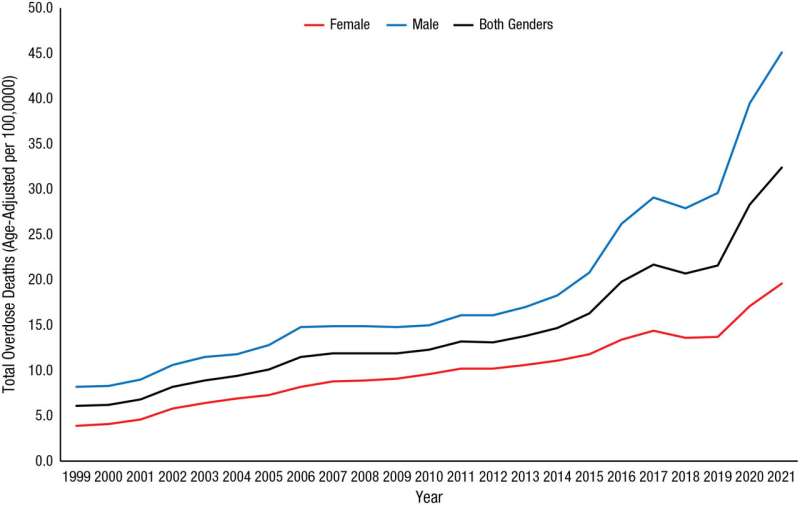This article has been reviewed according to Science X's editorial process and policies. Editors have highlighted the following attributes while ensuring the content's credibility:
fact-checked
peer-reviewed publication
trusted source
proofread
Substance-abuse stigma impedes treatment in various ways, scientists say

Addiction is one of society's most misunderstood and rebuked health conditions. That stigma discourages many people from seeking treatment for substance dependence, according to a new report published in Psychological Science in the Public Interest.
Research on stigma toward people with substance use disorder (SUD) is relatively sparse, the report adds.
"Characterizing the nature and etiology of SUD stigma is critical for developing tailored and effective interventions to combat it," wrote psychological scientist Anne C. Krendl and sociologist Brea L. Perry of Indiana University, Bloomington, in their review.
Substance dependence has become a national health threat. Drug overdose rates in the United States have climbed over the past 20 years, driven primarily by opioid and stimulant use. In a recent national survey, nearly 66 million Americans reported abusing alcohol over a 1-month period, and about 20 million reported using illegal narcotics and prescription drugs for nonmedical reasons.
Researchers measure stigma around both SUD and mental illness along three dimensions:
- public stigma—society's negative beliefs toward those who struggle with those disorders
- self-stigma—negative beliefs that the individuals hold toward themselves
- structural stigma—systemic rules, policies, and practices that discriminate against individuals with those disorders.
Overall, stigma research has focused primarily on mental health problems, the authors wrote. However, studies indicate that SUD is typically more stigmatized than mental illness, in part because substance use is viewed as more controllable. (Schizophrenia, however, elicits similar levels of stigma as does SUD, research shows.)
Experiments that have framed SUD as uncontrollable show some reduction in stigma, but that may have the unintended consequence of casting substance dependence as insurmountable, the authors wrote.
Studies of public stigma indicate that Americans express concerns about interacting with substance users, although that resistance ebbs toward individuals described as being in active recovery. People with SUD may face housing discrimination, reduced employment opportunities, and lowered income.
Studies also show variability in stigma among different types of substance dependence. For example, individuals who abuse illegal drugs such as heroin are perceived as more dangerous than those who abuse alcohol or prescription opioids.
The consequences of public stigma, along with structural and self-stigma, discourage individuals with SUD from seeking and persisting with treatment, research suggests.
Some studies have identified strategies aimed at reducing stigma, such as education designed to counter inaccurate beliefs, but those approaches have shown limited progress. This calls for researchers to develop stronger methods for reducing stigma. Strategies may include emphasizing an individual's recovery and the reduction of structural treatment barriers, such as inadequate insurance coverage and lack of access to evidence-based interventions.
In a commentary accompanying the report, APS James McKeen Cattell Fellow Stephen P. Hinshaw, a distinguished professor at University of California, Berkeley and University of California, San Francisco, points to successful treatments as possibly the "ultimate game-changer" in stigma reduction.
Hinshaw, whose work focuses on developmental psychopathology and mental illness stigma, notes that HIV/AIDS received massive stigma before antiretroviral therapies transformed it from a terminal to a survivable condition.
In another commentary, APS Fellow Kenneth J. Sher, a University of Missouri scholar renowned for his work on alcohol use disorder, calls for a more nuanced view of SUD stigma.
Terms such as SUD are "grossly nonspecific" and may lead to a broadened array of stereotypes, Sher said. The U.S. National Institutes of Health has proposed developing alternatives to SUD-related terminology such as "addict" and "abuser," but research should focus on the effects of that relabeling on stigma, he asserted.
More information: Anne C. Krendl et al, Stigma Toward Substance Dependence: Causes, Consequences, and Potential Interventions, Psychological Science in the Public Interest (2023). DOI: 10.1177/15291006231198193
Stephen P. Hinshaw, Stigma Related to Substance Use and Addiction: The Long Journey Ahead—Commentary on Krendl and Perry (2023), Psychological Science in the Public Interest (2023). DOI: 10.1177/15291006231202775
Kenneth J. Sher, The Heterogenous Nature of Substance Use and Substance Use Disorders: Implications for Characterizing Substance-Related Stigma, Psychological Science in the Public Interest (2023). DOI: 10.1177/15291006231212385





















